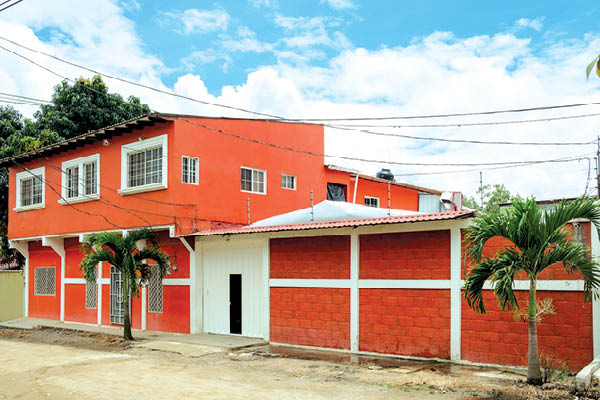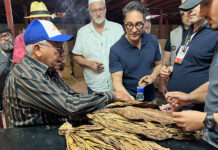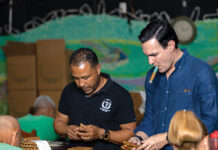
Creating a Happy Workplace
In 2021, Decoppet yet again took another gamble and opened his own cigar factory. While this was a major change and big investment, it was a necessary one, Decoppet says. “The brand requires very special and, in some cases, non-traditional attention to meet the standards that we have set,” he says. “We ended up coming to the conclusion that the only way to ensure that these standards were met with every single cigar every year was to control all these processes yourself. This was the birth of Fabrica Centroamericana de Tabaco S.A. (FCT).”
Making a cigar is one thing, but running an entire cigar factory is another. There are two key challenges in factory operations, according to Decoppet: people and sourcing. The factory requires the right people in the right positions, much like any well-run business. Also, these people need to not only have the necessary knowledge; they also need to be respected by their peers within the industry.
“They need to know how to manage fairly big teams, and not only that, these same people need to understand tobacco and all the processes that are involved all the way to the final product,” he says.
The other factor involved in running a factory is sourcing. Decoppet explains that you could have 10 factories, but if you have no tobacco, or don’t have the right tobaccos, then you basically don’t have what’s necessary to run even a single factory.
Having his own factory allows Decoppet to control the quality of the cigars he makes. When it comes to blending, his technique has evolved over the years. “The thought processes, the focuses, the interests in life change,” he says. “I would compare it to any other creative process. Something will pull a trigger and make you repeatedly go back to one thing until you decide to express your own vision of it. What matters is what you make of the tobaccos. The process starts before the blending itself.”
The factory is where most can see innovation at work within Decoppet’s business. While most people think of innovation as it relates to products, for Decoppet, innovation plays a big role in how his factory is managed.
“One of the handful of key points that had to be achieved with the opening of our factory was bringing a more Western and modern approach into the work environment of our factory,” he says.
Motola shares how his and Decoppet’s Western-influenced management style has had a positive impact on the factory’s workers: “In business, people use the words ‘management’ and ‘manager,’ and we use words like ‘leadership’ and ‘leader.’ It’s about putting the key people in place that know the difference. They know how to lead people versus managing them, like how you manage your finances or your exercise routine. You lead people, and you develop them, and you realize the strengths that they have and the weaknesses they have. You utilize their strengths and you improve on their weaknesses. The key difference here is we have leaders in all the departments that run the factory.
“It all comes down to how you communicate what you need to accomplish and the vision. If you’re going to manage people, generally you’re behind them telling them what they did wrong. If you’re going to lead them, you’re out in front of them, telling them what they’re going to do right. That’s the huge impact that taking that Western style of leadership has brought to the factory. Also, giving people input too. Somebody asked us how much input people in the factory have. They have all the input in the world! That communication, listening skills and leadership make a difference.”
Decoppet adds that a change that he’s seen take place in recent years has been the bigger focus on employees and their contentment while at work. Before the COVID-19 pandemic, business was mostly about quick profits and turnarounds that often came at the expense of employees’ happiness. Now, things have changed, and people realize that with the amount of time spent at work, one should be happy while working and they are no longer incentivized solely by a paycheck. When he and Motola built their factory, one of the things they discussed at great length was how people needed to feel while at work. Another thing discussed was the ambience they wanted to create within the factory and the team they were building. Since opening the factory, they’ve seen how genuinely happy their employees are to be at work. Some left other factories they had been at for years to come to work at Fabrica Centroamericana de Tabaco S.A.; others have come out of retirement to help Decoppet and the brand. The factory also had an interesting problem: They kept having to move up the factory’s opening time because the workers would arrive early each morning, ready to work.
Owning their own factory comes with its advantages, such as being able to establish a foundation with Cavalier’s team that enabled them to create the conditions to provide the exact end result that they want to bring to the market through Cavalier Cigars. In short, Fabrica Centroamericana de Tabaco S.A. gives Cavalier Cigars stability as well as control over its future.
The Cavalier Experience
The cigars that Decoppet has created have been the result of years of hands-on learning and experiences within the cigar industry. The White Series was the first blend Decoppet worked on. It was his first take on a mild to medium-strength cigar that also had some complexity to it. Black II was blended to give the cigar smokers a unique, old-school maduro cigar experience. The BII-Viso Jalapa’s blend was built around its viso Jalapa wrapper. This cigar has a deep, rich and oily profile that puts a new spin on maduro cigars. These cigars, Decoppet explains, are more than just blends; they are expressions of himself and a reflection of the experiences he’s had over the years while learning about cigars.
Motola puts it simply: Cavalier Genève’s unique selling point goes far beyond its blends. It’s all about the experience that inspired the blends and the journey Decoppet set out on when he left Switzerland and started over in Honduras. Cavalier Genève was born from Decoppet’s life of taking chances, of the factory workers’ dedication to creating something special. It’s a brand with a personality and history of its own. The next time you see the brand’s iconic gold diamond band, know that the cigar it covers isn’t just any cigar—it’s an expression of a journey Decoppet and others working at Cavalier Genève have taken and are offering to take others on if they’re bold enough to come along.
This story first appeared in the July/August 2022 issue of Tobacco Business magazine. Members of the tobacco industry are eligible for a complimentary subscription to our magazine. Click here for details.
– Photography courtesy of Cavalier Cigars. Story by Antoine Reid, senior editor and digital director for Tobacco Business Magazine. You can follow him on Instagram @editor.reid.







